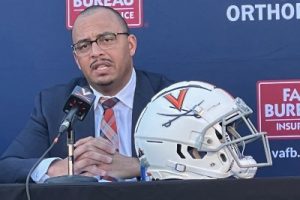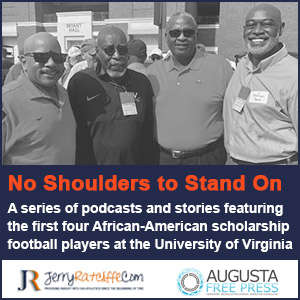Elliott has covered the bases in whirlwind of transition
By Jerry Ratcliffe
Tony Elliott’s head usually doesn’t hit the pillow until after midnight now that he has transitioned from assistant coach to head coach.
The first 51 days of his evolution have been a whirlwind for Virginia’s new boss man.
“The transition has created bags under my eyes, oh my gosh,” Elliott said in his first meeting with media since his introduction as head coach. “I had long days as an assistant, but as head coach it’s long days, and actually a lot more intense.”
Coming from Clemson, where he spent 11 years, moving up to co-offensive coordinator, there were lots of tasks he had to confront when taking over Bronco Mendenhall’s program.
Elliott had to hire a staff, deal with the comings and goings of the transfer portal, visit high school coaches around the state, try to finish up recruiting for the Class of 2022 (national signing day is Wednesday), and so much more.
Whirlwind would be a gross understatement.
“Every minute of the day you’re being pulled in a thousand directions and so it’s really about the ability to capture your thoughts and maintain your thought while entertaining another thought and another conversation,” said Elliott, who didn’t have to deal with that much back at Clemson, where such problems fell into the lap of head coach Dabo Swinney.
“That’s been the biggest adjustment or me, is to say, OK, I’m thinking about this, but I’ve got to be able to hold onto this thought and talk to this person here, and by the end of the day you’ve had numerous situations like that and you’re into the bed at night still thinking about everything that’s going on. It’s a good problem. It’s a lot until I’m able to process it all, figure it out and delegate.”
Elliott decided to retain three members of Mendenhall’s staff, two of them — Marques Hagans and Clint Sintim — former standout UVA football players, and offensive line coach Garett Tujague, who came to UVA from BYU with the former head coach.
Elliott blended those three with a selection of coaches from around the country, several of them from the service academies, to round out his staff.
Most assumed he reached out to the coaches from Army, Navy and Air Force to instill discipline to his program, but that wasn’t at all what Elliott was thinking. More on that in a moment.
Elliott decided to keep all the staff in operations that Mendenhall had put into place, and because that process was rolling, the new head coach wanted to let that be.
“I didn’t want to blow that up,” Elliott said. “I wanted to keep some continuity for the players.”
But he was on his own with all the rest.
“Then there was recruiting, then you’ve got donors, then you’ve got hiring coaches, then you’ve got your wife calling, and all kinds of stuff going on,” he said.
If he gets stuck and needs advice, there are three football gurus in his life that Elliott calls on. One of them is Swinney, who coached him as a receiver for the Tigers, and hired him as a coach. The others are Woody McCorvey, who has been associated with college football for 43 years, and Sly Jones, the first guy to take a chance on him as an assistant coach at South Carolina State.
“[Jones] is a guy I’ve been leaning on through the last few years from the head-coaching standpoint,” Elliott said. “Those are the three guys that I will lean on to help me navigate going forward.”
McCorvey is now chief of football administrators at Clemson, having worked there the first time on Danny Ford’s staff in the 1980s. McCorvey was also Swinney’s position coach at Alabama, and came back to Clemson in 2009, Swinney’s first full year in Death Valley.
Elliott wasn’t thinking military discipline at all when he reached out to hiring several coaches from the academies. Instead, when he thought about the type of prospects that fit the Virginia profile, he realized he needed assistants who knew how to identify and recruit players of character, players who could fit academically, and coaches who could “do more with less.”
Elliott had long-standing relationships with most of the staff he brought on board, so knew they could handle the challenge.
“It was a match made in heaven that they’re coming from Air Force, Army, Navy,” Elliott said. “Their backgrounds were what I was looking for. They understand the importance of that.”
Curome Cox, who was brought along by new defensive coordinator John Rudzinski from Air Force, fit that profile.
“John said if there was one guy he could bring along with him, that was his guy,” Elliott said. “I felt like I owed that to John to at least consider [Cox]. When he came for an interview, it was confirmed that I was convinced it was the right thing to hire him.”
Rudzinski was not hired because he had coached all the nuances of the 3-4 defense.
“For me, it was more finding a guy who understood how to coach a certain type of individual, who could recruit a certain kind of individual, considering the academic requirements that are part of our program,” Elliott said. “Not so much tied to the 3-4 scheme because I believe in being multiple.
“When you break it down, [Rudzinski] was probably 50-percent four down. Nowadays, you have to be multiple. You cannot sit still and just line up. I know as an offensive guy that if you just lined up in one particular front all day long, it made it easier for me to be able to put together a plan.”
Instead, Elliott wanted a guy who was passionate about young people, first and foremost, with a high football IQ, who understood defense.
The “does more with less” comment required some elaboration and Elliott was happy to explain that thought.
“If we can keep that mindset as we increase the level of talent and keep that foundation of doing more with less, we’ll be able to maximize the ability of the guys we recruit in the future,” Elliott said.
He understood from his days at Furman, also an academic-oriented program, that recruiters had to find players that fit that mold. Coaches from service academies also understood that philosophy.
Virginia’s new offensive coordinator, Des Kitchings, had crossed paths with Elliott over the years. They were both on the Furman staff for about a week, but Elliott was plucked by Clemson and Kitchings by Air Force.
“For years, we’ve been trying to link back up,” Elliott said of Kitchings, who came to Virginia from the Atlanta Falcons, where he was running backs coach. “I’m honored he would leave the NFL to be part of what we’re trying to build here.”
Keith Gaither, running backs and special teams coach, and Kevin Dowling, defensive tackles coach, started in the HBC ranks as Elliott did. Both Gaither and Dowling started their careers at Winston-Salem State while Elliott was at South Carolina State.
“They went on their way and they didn’t realize that I was interviewing them over my career, so I was excited for those guys,” Elliott said.
It took time to hire a staff, but Elliott, who is know to be very deliberate about almost everything he does, put it simply:
“I wanted to make sure we had the right people on the bus, and in the right seats on that bus.”
From the outside, it appears the bus roster is in proper order.









